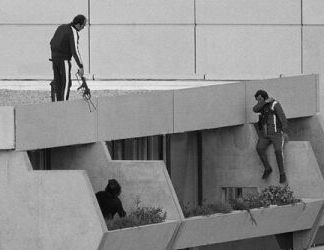|
As well as non-violent protests, the Olympic Games are often
targeted by terrorist groups. Terrorist attacks cause harm,
both in the effect of loss of life, as well as the political
implications. In the modern Olympic Games, security is paramount,
with both increased security personnel as well as surveillance
of terrorists. The greatest tragedy of the Olympic Games
occurred in 1968 when 11 athletes were killed. Before then
security at the games was relatively low-key, as it was unexpected
that a terrorist group would target athletes. After Munich,
the political aspect of the games was taken into much greater
consideration, both in terms of the hoist country's ability
to provide security and to allow the games to take place
in a stable environment.
On September 5th 1972, during the games held in Munich,
8 Arab terrorists infiltrated the Olympic village, in the
subsequent battles, 11 Israeli athletes were killed. This
attack was by far, the worst event in Olympic history.

This attack both highlighted the need for intense security
at the Olympic Games, as well as the need to consider complex
political issues surrounding the games. The gunmen were members
of the black September group; they entered the Olympic compound
and took members of the Israeli wrestling team hostage. It
was only when some members of the Israeli team escaped that
authorities were alerted. The terrorists demanded planes
for their escape; this resulted in a gunfight at Furstenfeldbruck
airport. The German police force were insufficiently trained
for this situation, this meant that they only assigned 5
snipers in security watch at the airport. This meant that
several Israeli athletes died in the resulting fire fight.
The result was that only 3 terrorists were captured alive
and detained for interrogation, all 11 athletes that were
held hostage were killed. A German police investigation found
that a few of the hostages may have been inadvertently shot
by German snipers.
The games were suspended for 24 hours following the attack.
A memorial service was held at the stadium and was attended
by over 80,000 people. The postponement of the games was
unprecedented but IOC President Avery Brundage announced
that “the games must go on”. Israeli competitor Mark Spitz,
who had set a gold medal record by winning four individual
and 3 relay swimming events, left the games over security
fears.
In terms of global terrorism, this was one of the most significant
events of it's time, with far reaching implications. Israel
responded by setting up a numbers of teams of security agents
and task forces, all those involved with the black September
group were hunted down and killed or imprisoned as retaliation.
The act greatly increased society's awareness of terrorism,
especially as such an event came suddenly, as well as in
a place expected to be peaceful. The main issue arising from
the crisis was the poor management by the Olympic security
staff as well as the German police force. Security around
the Olympic village where the athletes stayed was very little
and ill-equipped to deal with the situation. In the future
the IOC had much stricter criteria on the way the games should
be enforced and the capabilities of the host country in keeping
the games safe and peaceful and protecting the athletes involved.
Despite a vast improvement in security of the games terrorist
events still occur. IN Atlanta, one individual was able to
cause significant damage as well as loss of life. The events
in Munich meant that security was a far more serious consideration
during future games. For example, in Sydney, 5,000 military
personnel and thousands of police and intelligence officers
were employed. Sydney also pioneered the use of members of
the public as security personnel. Here 50,000 were trained
in security matters and given powers to search, remove and
detain people.
|


